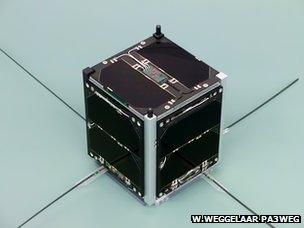Rocket deploys spacecraft armada
- Published

Cubesats like Funcube-1 are just 10cm across
A Dnepr rocket launching from Yasny in Russia has set a record for the most payloads carried to orbit in a single mission.
The converted intercontinental missile released 32 objects in space - mostly small, so called "cubesats".
The main payload was a 300kg Earth imaging platform for the United Arab Emirates known as DubaiSat-2.
Weighing in at just 97g was an 8cm-long temperature sensor, due to be separated later from a Peruvian cubesat.
The Pocket-PUCP, external sensor is thought to be the smallest functional satellite ever put above the Earth.
The Dnepr launch occurred at 07:10 GMT.
It comes just a day after a US Minotaur 1 rocket put 29 satellites in orbit - again, mostly cubesats.
These diminutive spacecraft have become extremely popular with university groups in recent years.
Their simplicity and low cost makes it possible for students to work on real space hardware.
British interest in Thursday's launch included Funcube-1, external. This 1kg box carries a transponder that will transmit signals that can be picked up by schoolchildren using a simple USB dongle receiver and small aerial.
The intention of the project, developed by Amsat-UK, external, is to get youngsters interested in radio, space, physics and electronics.
Although Funcube-1 is a British payload, the difficulties of obtaining space licensing under UK legislation means it is flying with a Dutch flag.
Amsat supporters had gathered on Thursday at the National Radio Centre at Bletchley Park to follow the launch. Telemetry confirming the health of Funcube-1 was picked up shortly after separation from the Dnepr.
Other UK interest centred on the Cinema 2 & 3 cubesats, external (also known as KHUSat 1 & 2). The pair are a collaboration between the University of California at Berkeley, South Korea's Kyung Hee University and Imperial College London and will study the near-Earth environment and its interaction with the Sun.
Imperial's contribution is a mini-magnetometer called Magic, to record conditions in the magnetosphere - the bubble of magnetic field lines that envelops the planet and deflects much of the matter thrown in our direction by the Sun.
One Cinema cubesat was launched in September last year.
Jonathan.Amos-INTERNET@bbc.co.uk and follow me on Twitter: @BBCAmos, external
- Published28 October 2013
- Published7 February 2013
- Published22 January 2013